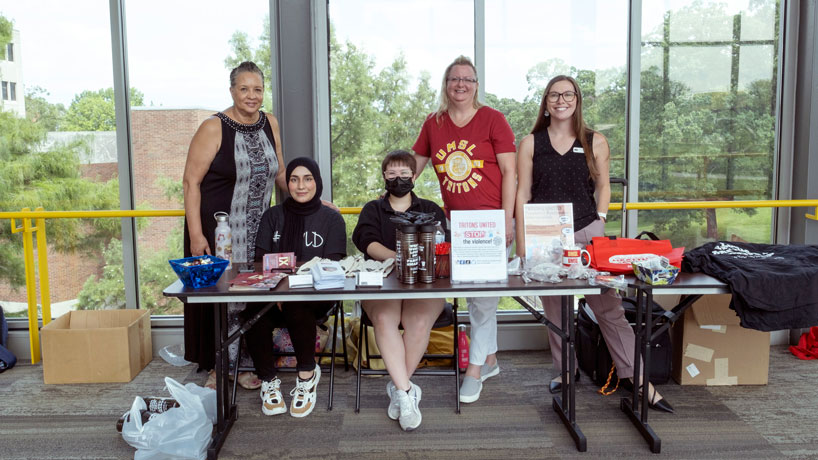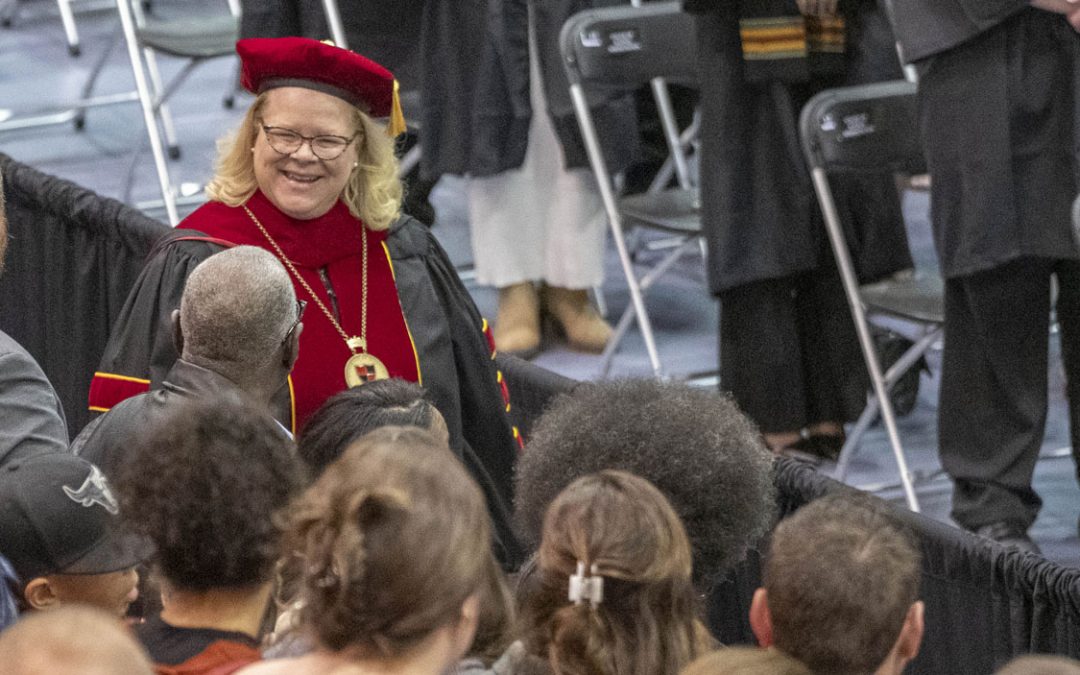
Left to right: Dana Beteet Daniels, Title IX administrator, chief equity officer and ADA coordinator; Heela Momand, vice president of Triton Health Educators; Finn Kennett, Triton Health Educators member; Maggie Gross, Tritons United program director; and Abigail Gazvoda, victim advocate with UMSL’s Counseling Services at a recent tabling event. (Photo by August Jennewein)
At a recent bystander intervention training, Maggie Gross asked a room full of University of Missouri–St. Louis students the same question she asks each time she conducts an educational training: “Have you ever experienced sexual assault, dating/domestic violence or stalking incidents, whether you heard about it, whether you witnessed it or whether you were directly involved with it?”
Every single student raised their hands.
“You find out that, unfortunately, it’s still so very relevant and so many people are experiencing these types of incidents,” she said. “So [something] is definitely needed to help educate and prevent more of this stuff from happening.”
As project director, Gross hopes that Tritons United: Against Gender Based Violence can play a pivotal role in reducing these types of gender-based violence on campus with its preventative and responsive programming for students, faculty, and staff.
Led by Gross and College of Nursing Associate Professor and Associate Dean of Research Kim Werner, Tritons United was established in October 2019 with the help of a $300,000 Office of Violence Against Women campus grant from the United States Department of Justice. Gross and Werner both have a vested interest in reducing instances of sexual assault, dating/domestic violence, stalking and other forms of gender-based violence, and they knew others on campus, did too – they just lacked the resources. The Department of Justice grant, Gross said, was instrumental in overcoming that barrier.
“Before the grant started, everything was kind of piecemeal,” Gross said. “People were trying their best, but it wasn’t coordinated; it wasn’t comprehensive. We just didn’t have the manpower, internal structure or staff support to do it. Then this grant came along, and we’ve been able to be more coordinated and comprehensive in our campus interventions bringing together so many different campus departments and local community organizations.”
To that end, in its initial stages, Tritons United established a Coordinated Community Response Team (CCRT) that examines prevention and response strategies through a comprehensive lens. The 27-person team consists of UMSL students, staff, and faculty as well as representatives from off-campus partners including the Crime Victim Center, Safe Connections, and St. Louis County Police Department. The group develops and oversees aspects of the campus response, reporting, prevention, and education efforts with regard to gender-based violence, with a long-term goal of creating sustainable and lasting changes system-wide.
Kayla Bowling, president of Triton Health Educators, said her decision to serve on the CCRT was an easy one, as both campus programs – have similar goals. And by exposing her to new information and resources, she feels that working with Tritons United has made her a better peer educator.
“We’ve seen with a lot of the data that we get from our campus that there is a serious need for these prevention-based groups on campus,” Bowling said. “It’s especially important to put those resources where the faculty and students can easily access it, and that’s exactly what Tritons United is there to do. I have so many students come back to me and say, ‘Hey, thank you so much for giving that to me, because I didn’t even know that I could use that.’”
Now in its third year, Tritons United has implemented several initiatives to further that goal, including campus awareness events and trainings as well as resources such as a faculty guidebook and a resource kit.
The resource kit, which is available to download through Tritons United’s social media platforms and by QR code, is a comprehensive guide to the support services and resources that are available to anyone who needs them. These include organizations both on campus, such as CARE, the Title IX Equity Office and the UMSL Police Department, and in the community, including ALIVE, Safe Connections, SQSH and YWCA Metro St. Louis. An accompanying curriculum is available for campus first responders to better understand the resource kit – what’s in it, how to utilize it and how to share that information – when they are responding to a gender-based violence incident.
The group has also created a faculty guidebook and training sessions facilitated by Title IX Coordinator and Chief Equity Officer Dana Beteet Daniels (who also serves on the CCRT) in support and collaboration with the Center for Teaching and Learning.
“If a faculty member overhears a student say they’re in an unhealthy relationship or hears about someone stalking them when they’re coming to and from their classroom, we have this guide for them of how to respond, how to report it, and how to help support your student,” Gross said. “It also provides them with resources if they want to incorporate some gender-based violence material into their course curriculum.”
Campus-wide awareness events and trainings give Tritons United the opportunity to engage directly with UMSL faculty, staff, and students about gender-based violence. The group’s “office hours,” or tabling events, feature professional representatives from both on and off campus professionals who work in the field. At the casual, walk-up events, visitors can stop by different tables to learn more about victim support services and advocacy, legal assistance, physical and mental health, LGBTQIA+ support, and more.
Additionally, Tritons United offers five different hour-long educational trainings that are facilitated by Gross or Brigid Welch of Safe Connections, who also works on the CCRT. Topics have included “Bystander Intervention,” “Unpacking Rape Culture,” “Intimate Partner Violence on College Campuses,” “Getting Consent,” “Substance Use and Bystanders” and “Survivor Support & Safety Planning,” and each training has audience participation or activities, such as breakout sessions, built into the curriculum.
Daniels and Gross both applaud UMSL Athletics for being an early adopter of the trainings, with every student-athlete, coach, and athletic administrator having completed the “Bystander Intervention” training.
The next event, a presentation on “Unpacking Rape Culture,” will be held Sept. 20 at 1 p.m. in Room 316 of the Millennium Student Center. The rest of this fall’s events will center on National Domestic Violence Awareness Month in October and International Activism Against Gender-Based Violence in November:
- Domestic Violence Campus Office Hours
Oct. 12, 11 a.m. to 1 p.m.
MSC, The Bridge - Getting Consent Presentation
Oct. 12, 3 to 5 p.m.
MSC, Room #316 - Bystander Intervention Presentation
Oct. 26, 2 to 4 p.m.
MSC, Room #316 - Survivor Support & Safety Planning Presentation
Nov. 8, 1 to 3 p.m.
MSC, Room #316 - Unpacking Rape Culture Presentation
Nov. 15, 2 to 4 p.m.
MSC, Room #316
As they await news on a second round of federal funding, Tritons United is examining ways to continue to expand and diversify its programming. In the future, Gross hopes to tailor trainings to groups who have been historically marginalized, such as the LGBTQIA+ and BIPOC communities, and also to engage more men with the program. For now, a major priority is just making sure people know this group – and its resources – exists.
“We want people to know that we’re out there, that we have resources available for them and that we’re educating the campus community with regard to those resources and options that are available to them,” Daniels said.
“I’m blown away at the resources that other campuses in our area have available,” Gross adds. “I would like for UMSL to also be in that pioneering stage because it goes along with our mission statement for us to be a beacon of hope, a force for good. Our mission statement asks for us to be active and transform lives, so that goes right along with what Tritons United is all about.”














